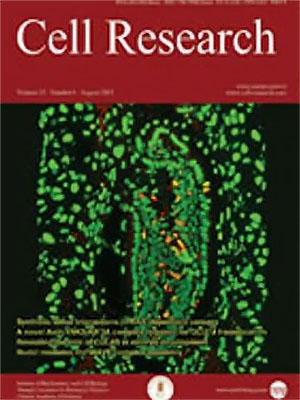
Volume 14, No 2, Apr 2004
ISSN: 1001-0602
EISSN: 1748-7838 2018
impact factor 17.848*
(Clarivate Analytics, 2019)
Volume 14 Issue 2, April 2004: 134-140
ORIGINAL ARTICLES
LDFF, the large molecular weight DNA fragmentation factor, is responsible for the large molecular weight DNA degradation during apoptosis in Xenopus egg extracts
Zhi Gang LU, Chuan Mao ZHANG*, Zhong He ZHAI*
Department of Cell Biology and Genetics, College of Life Sciences, Peking University, Beijing 100871, China.
Correspondence: Chuan Mao ZHANG Zhong He ZHAI(zhangcm@pku.edu.cn zhonghezhai@pku.edu.cn )
DNA degradation is a biochemical hallmark in apoptosis. It has been demonstrated in many cell types that there are two stages of DNA fragmentation during the apoptotic execution. In the early stage, chromatin DNA is cut into large molecular weight DNA fragments, although the responsible nuclease(s) has not been recognized. In the late stage, the chromatin DNA is cleaved further into short oligonucleosomal fragments by a well-characterized nuclease in apoptosis, the caspase-activated DNase (CAD/DFF40). In this study, we demonstrate that large molecular weight DNA fragmentation also occurs in Xenopus egg extracts in apoptosis. We show that the large molecular weight DNA fragmentation factor (LDFF) is not the Xenopus CAD homolog XCAD. LDFF is activated by caspase-3. The large molecular weight DNA fragmentation activity of LDFF is Mg
2+-dependent and Ca
2+-independent, can occur in both acidic and neutral pH conditions and can tolerate 45℃ treatment. These results indicate that LDFF in Xenopus egg extracts might be a new DNase (or DNases) responsible for the large DNA fragmentation.
FULL TEXT | PDF
Browse 2021


